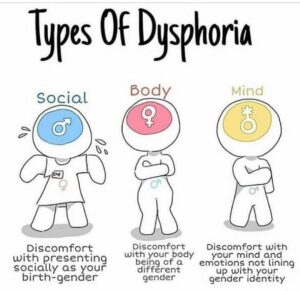Dysphoria is a condition that affects a person’s emotions and sense of identity. It can cause significant distress and can interfere with daily life. In this blog post, we will discuss everything about dysphoria – from its types and symptoms to how to cope with it. We will also hear from experts about their experiences living with dysphoria.
Contents
Understanding Dysphoria
Dysphoria is a condition that can affect anyone, regardless of sex, gender identity, or sexual orientation. Thus, it is characterized by a feeling of unease or dissatisfaction with one’s body, appearance, or self. Furthermore, dysphoria can be accompanied by a wide range of symptoms, which can vary from person to person.
Types of Dysphoria

There are three main types of dysphoria:
Gender dysphoria: This type occurs when a person experiences discomfort or distress. Because there is a mismatch between their sex and gender identity. For example, someone with gender dysphoria may feel that they are actually a woman trapped in a man’s body, or vice versa.
Body dysmorphic disorder (BDD): This type is characterized by an excessive preoccupation with one or more perceived flaws in one’s appearance. Evidently, people with BDD may obsess over minor details or features that others would not even notice. As a result, this can lead to significant distress and impairment in daily life.
Social dysphoria: This type occurs when a person experiences discomfort or distress due to a mismatch between their personal identity and the way they are perceived by others. Thus, social dysphoria can be particularly difficult to deal with because it can lead to feelings of isolation and rejection.
Symptoms of Dysphoria
The symptoms of dysphoria can vary from person to person, but there are some common ones that people often experience. However, some of these include:
- Anxiety
- Depression
- Irritability
- Mood swings
- Sleep problems
- Chronic fatigue
- Social withdrawal
- Poor concentration
- Changes in appetite or eating habits
- Loss of interest in activities that were once enjoyable
NOTE: Dysphoria can also lead to disordered eating, such as anorexia nervosa or bulimia nervosa.
Causes of Dysphoria
Though, there is no single cause of dysphoria. It is thought to be caused by a combination of biological, psychological, and social factors.
Biological factors: Some research suggests that there may be a link between dysphoria and certain hormones or brain structures. For example, people with gender dysphoria often have higher levels of the hormone testosterone.
Psychological factors: It is thought that psychological factors such as stress, anxiety, and depression may contribute to the development of dysphoria.
Social factors: Social factors such as discrimination and bullying can also play a role in the development of dysphoria.
Risk Factors of Dysphoria
Several risk factors can increase the chances of developing dysphoria. However, some of these include:
- A history of trauma or abuse
- A family history of mental illness
- Taking certain medications, such as steroids or hormone therapy
- Living in a society that is not supportive of diverse gender identities
- Certain medical conditions, such as hormonal disorders or chronic illnesses
Dysphoria Vs. Dysmorphia
It is important to understand the difference between dysphoria and dysmorphia. Both conditions are characterized by a feeling of uneasiness or dissatisfaction with one’s body, appearance, or self. However, the former is a broader condition that can include social and emotional aspects. While the latter is limited to the physical aspect of appearance.
Dysmorphia is a type of body dysmorphic disorder, and it occurs when a person becomes obsessively preoccupied with one or more perceived flaws in their appearance. As a result, people with dysmorphia may fixate on details that others would not even notice. Eventually, this can lead to significant distress and impairment in daily life.
Diagnosing Dysphoria
If you think you may be experiencing dysphoria, it is important to talk to a doctor or mental health professional. They will be able to assess your symptoms and rule out other conditions.
Although there is no specific test for diagnosing this condition. However, the Diagnostic and Statistical Manual of Mental Disorders (DSM-V) includes criteria that doctors can use to make a diagnosis.
To be diagnosed with dysphoria, a person must:
- The symptoms must have been present for at least six months
- Have persistent discomfort with their own gender identity or sex
- Have a strong and persistent desire to be of the opposite gender or sex
- Experience significant distress or impairment in social, occupational, or other areas of functioning due to these feelings
Living With Dysphoria

Dysphoria can be a very challenging condition to live with. As it can cause a great deal of distress and make everyday activities difficult to manage. As a result, people with this condition may feel like they are stuck in a never-ending cycle of distress and unhappiness.
Impact on Life
This condition can have a significant impact on a person’s life. It can make it difficult to maintain relationships and succeed at work.
Relationships: People with dysphoria may find it difficult to form close relationships due to their feelings of isolation and loneliness. As a result, they may also feel uncomfortable being around people who do not understand their condition.
Work: Dysphoria can make it difficult to focus on tasks and perform well at work. Consequently, people with dysphoria may feel like they are constantly struggling or that they are not good enough. This can lead to feelings of shame and low self-esteem.
Impact on Health
This condition can also take a toll on a person’s physical and mental health. It can cause a variety of physical symptoms and can also lead to mental health problems.
Mental Health: People with dysphoria may experience anxiety, depression, and other mood disorders. They may also have low self-esteem and body image issues.
Physical Health: People with dysphoria may also experience physical health problems due to their condition. For example, they may develop eating disorders or suffer from chronic stress.
Coping With Dysphoria

Various coping strategies can help people manage their dysphoria. However, some of these include:
Self-help Tips
Several self-help tips can help people manage their condition. Some of these include:
Staying positive: It is important to focus on the positive aspects of life and not dwell on the negative.
Setting realistic goals: It is important to set realistic goals and not strive for perfection.
Accepting oneself: It is important to accept oneself for who one is and not try to change.
Developing a support network: It is helpful to develop a support network of family and friends who can offer understanding and support.
Seeking professional help: If you are struggling to cope with your dysphoria, it may be helpful to seek professional help.
Self-help Tools
Several self-help tools can help people manage their condition. However, some of these include:
Journaling: Journaling can be a helpful way to express thoughts and feelings.
Art therapy: Art therapy can help people process difficult emotions and experiences.
Mindfulness: Mindfulness can help people focus on the present moment and reduce stress.
Movies: Several movies can help people understand and relate to the experiences of those with dysphoria.
Books: Several books can help people learn more about their condition and how to cope with it.
Websites: Several websites provide information and support for people with dysphoria.
Self-help Techniques
Several self-help techniques can help people manage their condition. However, some of these include:
Diet: Eating a healthy diet can help people feel better physically and mentally.
Sleep: Getting enough sleep can help improve mood and energy levels.
Exercise: Exercise can help people release tension and improve their mood.
Yoga: Yoga can help improve flexibility and reduce stress.
Relaxation techniques: Relaxation techniques such as yoga and meditation can help people manage their stress and anxiety.
Talking To Professional

If you are struggling to cope with this condition, it may be helpful to talk to a professional. Several professionals can help, including:
- Doctors: Doctors can provide information on treatments and therapies for dysphoria.
- Psychiatrists: Psychiatrists can prescribe medication to help manage dysphoria.
- Therapists: Therapists can offer support and guidance in managing dysphoria.
Several experts can provide information and support for people with dysphoria. However, some of these include:
- Transgender organizations: Transgender organizations can offer information and support on transitioning and dealing with dysphoria.
- Gender therapists: Gender therapists can help people explore their gender identity and find ways to cope with dysphoria.
- Medical professionals: Medical professionals can provide information on treatments and therapies for dysphoria.
There are several reasons why you may want to seek professional support. However, some of these include:
- You are struggling to cope with your dysphoria.
- Your physical health is negatively affected by your dysphoria.
- You want to learn more about your condition and how to cope with it.
- You are experiencing anxiety, depression, or other mental health problems.
Therapies
Several therapies can help people manage their condition. However, some of these include:
Counseling: Counseling can help people understand and process their feelings about dysphoria.
Psychotherapy: Psychotherapy can help people address the underlying causes of their dysphoria.
Cognitive-behavioral therapy: Cognitive behavioral therapy can help people change their negative thoughts and behaviors.
DBT: Dialectical behavioral therapy can help people manage their emotions and relationships.
Medication
Several medications can help people manage their condition. However, some of these include:
Antidepressants: Antidepressants can help relieve symptoms of depression and anxiety.
Anti-anxiety medications: Anti-anxiety medications can help reduce stress and anxiety.
Hormone therapy: Hormone therapy can help align a person’s physical appearance with their gender identity.
Surgery: Surgery can help change the physical features that cause dysphoria.
Risks In Hormone Therapy
There are several risks associated with hormone therapy. However, some of these include:
- blood clots
- stroke
- heart attack
- cancer
- liver disease
- osteoporosis
- mood swings
- weight gain or loss
- changes in sex drive
Risks In Surgery
There are several risks associated with surgery. However some of these include:
- infection
- bleeding
- scarring
- numbness or tingling
- damage to organs
- changes in sex drive
- emotional problems
Case Study
Diane is a 38-year-old transgender woman who has been dealing with dysphoria for most of her life. Although, she has tried several different therapies and medications. But nothing has helped relieve her symptoms. Thus, Diane is considering surgery as a last resort.
NOTE: It is important to consult a doctor before starting any therapy to make sure it is the right choice for you.
Hearing From Experts
“Dysphoria is a condition that can be very debilitating for those who experience it. It’s important to seek out professional help if you are struggling to cope with your dysphoria. Several therapies and medications can help, so don’t give up hope.” – Dr. Sarah Edwards, Psychiatrist
Movies And Books
Several movies and books can help people learn more about their condition and how to cope with it. However, some of these include:
Movies
- The Danish Girl: This movie is based on the true story of a transgender woman who underwent surgery to transition.
- Transamerica: This movie follows the story of a transgender woman who is dealing with her dysphoria.
- Boys Don’t Cry: This movie is based on the true story of a transgender man who was brutally murdered.
Books
- Becoming Nicole: This book tells the story of a family who has to come to terms with their transgender daughter.
- The Transgender Child: This book offers information and advice for parents of transgender children.
Conclusion
Dysphoria can be a difficult condition to manage, but there are many tools and resources available to help. Thus, by focusing on the positive aspects of life and seeking professional help when needed, it is possible to live a fulfilling life despite this condition.
Please feel free to contact us if you have any questions or would like more information about our services. We are here to help!
A Word From Therapy Mantra
Your mental health — Your psychological, emotional, and social well-being — has an impact on every aspect of your life. Positive mental health essentially allows you to effectively deal with life’s everyday challenges.
At TherapyMantra, we have a team of therapists who provide affordable online therapy to assist you with issues such as depression, anxiety, stress, workplace Issues, addiction, relationship, OCD, LGBTQ, and PTSD. You can book a free therapy or download our free Android or iOS app.


